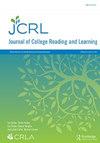编辑团队的注释
Q2 Social Sciences
引用次数: 0
摘要
这一期的《大学阅读与学习杂志》为大学阅读与学习协会的成员提供了一些重要的问题,涵盖了多个学生群体和学科领域。在学生群体方面,我们收录的论文关注的是来自特定文化背景(Sarker & Paulson)和语言背景(İhtiyaryer & Altun)的学生,以及目前被监禁的(潜在)学生(Lollar, Mueller和Anthony)。在学科领域方面,这期的论文涵盖了数学(Ray, Herron, & Bullock),发展素养(Sarker & Paulson)和英语语言学习(İhtiyaryer & Altun)。我们希望你能找到一些激起你兴趣的东西,并在这个不同的问题上为你的实践提供信息。本期我们从乔纳森·罗拉、卡罗尔·利亚·穆勒和韦斯·安东尼合著的《惩教教育中的学生:发展教育中被遗忘的人群》开始。作者利用先前公布的数据,比较了监狱和家庭样本,以确定在教育愿望和成就、基本技能(阅读、写作和数学)活动的使用、第一代身份以及读写和计算能力得分方面的潜在差异。他们发现,被监禁的人往往受教育程度较低,计算能力和读写能力得分较低,而且更有可能成为第一代。然而,监狱里的许多人都有受教育的愿望。作者认为,在监狱中增加发展教育支持有可能帮助被监禁的人实现他们的教育目标。2023年7月1日,大约在本期出版的时候,被监禁的人将有资格获得佩尔助学金,以支持他们通过合格的监狱教育项目学习(“资格”,2023),这是一个特别及时的问题。Amy Ray、Julie Herron和Emma Bullock在《探索未来小学教师轨迹中的数学词汇一致性:案例研究》中,对小学基础数学课程和职前教师(pst)在课程准备的各个阶段参与课程时遇到的数学词汇进行了定性分析。在建构主义原则的指导下,作者在一所中等规模的大学花了一个学期的时间回答了两个研究问题:1)初级pst需要知道的关键词汇是什么?(2)《大学阅读与学习》杂志2023年第53期3,167 - 169 https://doi.org/10.1080/10790195.2023.2222564本文章由计算机程序翻译,如有差异,请以英文原文为准。
A Note from the Editorial Team
This issue of the Journal of College Reading and Learning provides a small taste of the diverse issues of importance to members of the College Reading and Learning Association, spanning multiple student populations and subject areas. In terms of student population, we include papers focusing on students from specific cultural (Sarker & Paulson) and linguistic (İhtiyaryer & Altun) backgrounds, as well as (potential) students who are currently incarcerated (Lollar, Mueller, and Anthony). In terms of subject area, the papers of the issue cover mathematics (Ray, Herron, & Bullock), developmental literacy (Sarker & Paulson), and English language learning (İhtiyaryer & Altun). We hope you find something that piques your interest and informs your practice in this varied issue. We begin this issue with “Students in Correctional Education: Developmental Education’s Forgotten Population,” by Jonathan Lollar, Carol Leah Mueller, and Wes Anthony. Using previously published data, the authors compare prison and household samples to identify potential differences in educational aspirations and attainment, use of basic skills (reading, writing, and math) activities, first-generation status, and literacy and numeracy proficiency scores. They found that incarcerated individuals tended to have lower educational attainment, lower numeracy and literacy proficiency scores, and a higher likelihood of having first-generation status. Nevertheless, many in the prison population had educational aspirations. The authors argue that increased developmental education supports in prisons have the potential to help incarcerated individuals reach their educational goals. On July 1, 2023, around the time of this issue’s publication, incarcerated individuals will become eligible to receive Pell Grants to support their learning through eligible prison education programs (“Eligibility,” 2023), making this a particularly timely issue. In “Exploring Mathematics Vocabulary Alignment in a Future Elementary Teacher’s Trajectory: A Case Study,” Amy Ray, Julie Herron & Emma Bullock conduct a qualitative analysis of an elementary foundations mathematics course and the mathematics vocabulary encountered by pre-service teachers (PSTs) as they engage with the curriculum at various stages of course preparation. Guided by tenets of constructivism, the authors took a semester at a mid-sized university to answer two research questions: 1) What is the key vocabulary that elementary PSTs need to know? and 2) How is the key vocabulary JOURNAL OF COLLEGE READING AND LEARNING 2023, VOL. 53, NO. 3, 167–169 https://doi.org/10.1080/10790195.2023.2222564
求助全文
通过发布文献求助,成功后即可免费获取论文全文。
去求助
来源期刊

Journal of College Reading and Learning
Social Sciences-Linguistics and Language
CiteScore
1.60
自引率
0.00%
发文量
23
期刊介绍:
The Journal of College Reading and Learning (JCRL) invites authors to submit their scholarly research for publication. JCRL is an international forum for the publication of high-quality articles on theory, research, and policy related to areas of developmental education, postsecondary literacy instruction, and learning assistance at the postsecondary level. JCRL is published triannually in the spring, summer, and fall for the College Reading and Learning Association (CRLA). In addition to publishing investigations of the reading, writing, thinking, and studying of college learners, JCRL seeks manuscripts with a college focus on the following topics: effective teaching for struggling learners, learning through new technologies and texts, learning support for culturally and linguistically diverse student populations, and program evaluations of developmental and learning assistance instructional models.
 求助内容:
求助内容: 应助结果提醒方式:
应助结果提醒方式:


